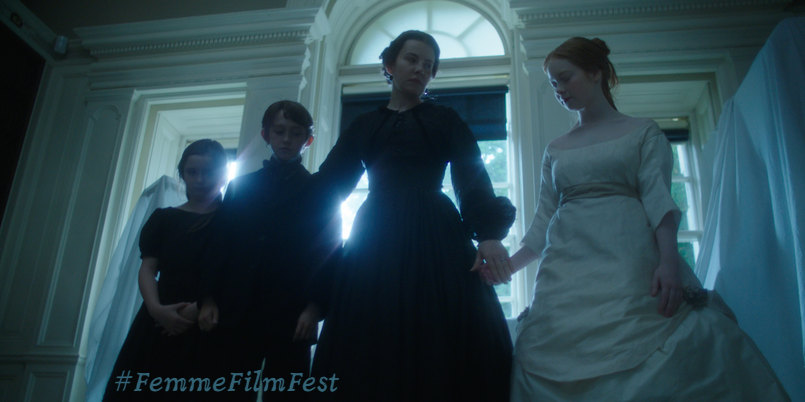I love short films like I love short stories: when done well, they can draw their viewer (or reader) in to their world in an instant, and tell a drama or a character study with only the bare essentials. Family Portrait is a perfect example – a surprisingly effective little film. .
Family Portrait is a 15 minute long period domestic drama, focusing on Margaret (Allison McKenzie) and all her closest relationships: children, husband, brother-in-law and maid. We see holding together some modicum of dignity while managing the family portrait and at the same time planning some ongoing security for them all. The recent death of her husband has repercussions.
That may sound like a lot to cover in 15 minutes, but it is beautifully done. Everyone has something to say, presenting their angle on what’s happening, and (to one degree or another) a little of their own characters too. Or a lot, in the case of Margaret and her oldest daughter Louise (Kate McLaughlin):
Louise: “I want to be someone!”
Margaret: “We can’t be anyone: we’re women.”
Allison McKenzie and Douglas Russell (who plays Uncle William) are the only two familiar faces in this Family Portrait. I’d seen McKenzie in Line of Duty and one or two other British TV shows, but she’d never quite stood out as she does in this part: her barely controlled frustration and anger make it riveting from the start. Russell has had parts in Valhalla Rising and a number of other mostly period roles. In Family Portrait, he doesn’t have much to say, but says more of it with his face than his dialogue.
The younger children briefly let down the cast, but the absolute stand-out was Kate McLaughlin as the independent-minded but loyal Louise. She has almost exclusively played in short films until now, but I’m tempted to rent her one feature to date, Isolani.
This short works so well because although there are more than enough characters and plenty of content, there are absolutely no unnecessary details. Consequently, there is still plenty that is left unexplained. Questions are raised, and tantalisingly left unanswered, but yet the story is still as complete as it needs to be.
Nils Gustenhofen’s screenplay must be one of the best I’ve encountered in a film of this length. That said, I would very much like to see a feature length version (as the sci-fi film Prospect was made after its successful short), or a feature which uses this short as a starting point. Or maybe Lady Macbeth already did that.
Kelly Holmes’ direction of Family Portrait could hardly have been better either. She leads us into what is essentially single scene presenting a snapshot of the family; and yet without any rush. We get to know the key players by looking at their faces, and then hearing what’s on their minds. The production is superb, too: the sets and lighting match the quality of Howard’s End, for example. While the use of music is subtle, surrounding the story, rather than exaggerating any tension.

